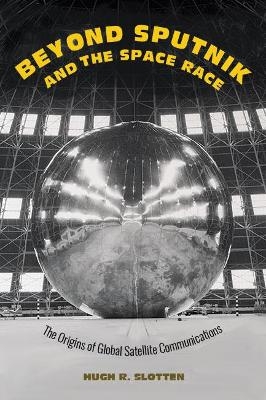
Beyond Sputnik and the Space Race
The Origins of Global Satellite Communications
Seiten
2022
Johns Hopkins University Press (Verlag)
978-1-4214-4122-1 (ISBN)
Johns Hopkins University Press (Verlag)
978-1-4214-4122-1 (ISBN)
A fascinating account of how the United States established the first global satellite communications system to project geopolitical leadership during the Cold War.
On July 20, 1969, the world watched, spellbound, as NASA astronaut Neil Armstrong stepped off the Apollo 11 lunar module to walk on the moon. NASA estimated that 20 percent of the planet's population—nearly 650 million people—watched the moon landing footage, which was made possible by the first global satellite communications system, the International Telecommunications Satellite Organization, or Intelsat.
In Beyond Sputnik and the Space Race, Hugh R. Slotten analyzes the efforts of US officials, especially during the Kennedy administration, to establish this satellite communication system and open it to all countries of the world. Locked in competition with the Soviet Union for both military superiority and international prestige, President John F. Kennedy overturned the Eisenhower administration's policy of treating satellite communications as simply an extension of traditionally regulated telecommunications. Instead of allowing private communications companies to set up separate systems that would likely primarily serve major "developed" regions, the new administration decided to take the lead in establishing a single world system. Explaining how the East-West Cold War conflict became increasingly influenced by North-South tensions during this period, Slotten highlights the growing importance of non-aligned countries in Asia, Latin America, and Africa. He also underscores the importance of a political economy of "total Cold War" in which many crucial aspects of US society became tied to imperatives of national security and geopolitical prestige.
Drawing on detailed archival records to examine the full range of decisionmakers involved in the Intelsat system, Beyond Sputnik and the Space Race spotlights mid- and lower-level agency staff usually ignored by historians. One of the few works to analyze the establishment of a major global infrastructure project, this book provides an outstanding analytical overview of the history of global electronic communications from the mid-nineteenth century to the present.
On July 20, 1969, the world watched, spellbound, as NASA astronaut Neil Armstrong stepped off the Apollo 11 lunar module to walk on the moon. NASA estimated that 20 percent of the planet's population—nearly 650 million people—watched the moon landing footage, which was made possible by the first global satellite communications system, the International Telecommunications Satellite Organization, or Intelsat.
In Beyond Sputnik and the Space Race, Hugh R. Slotten analyzes the efforts of US officials, especially during the Kennedy administration, to establish this satellite communication system and open it to all countries of the world. Locked in competition with the Soviet Union for both military superiority and international prestige, President John F. Kennedy overturned the Eisenhower administration's policy of treating satellite communications as simply an extension of traditionally regulated telecommunications. Instead of allowing private communications companies to set up separate systems that would likely primarily serve major "developed" regions, the new administration decided to take the lead in establishing a single world system. Explaining how the East-West Cold War conflict became increasingly influenced by North-South tensions during this period, Slotten highlights the growing importance of non-aligned countries in Asia, Latin America, and Africa. He also underscores the importance of a political economy of "total Cold War" in which many crucial aspects of US society became tied to imperatives of national security and geopolitical prestige.
Drawing on detailed archival records to examine the full range of decisionmakers involved in the Intelsat system, Beyond Sputnik and the Space Race spotlights mid- and lower-level agency staff usually ignored by historians. One of the few works to analyze the establishment of a major global infrastructure project, this book provides an outstanding analytical overview of the history of global electronic communications from the mid-nineteenth century to the present.
Hugh R. Slotten is an associate professor in the Media, Film and Communication Program at the University of Otago. He is the author of Patronage, Practice, and the Culture of American Science: Alexander Dallas Bache and the US Coast Survey and Radio's Hidden Voice: The Origins of Public Broadcasting in the United States.
Acknowledgments
Introduction
Chapter 1. US Industry, the Cold War, and the Development of Satellite Communications
Chapter 2. The Kennedy Administration and the Communications Satellite Act of 1962
Chapter 3. Global Satellite Communications and the 1963 International Telecommunication Union Space Radio Conference
Chapter 4. Organizing the First Global Satellite Communications System
Conclusion
Notes
Index
| Erscheinungsdatum | 09.02.2022 |
|---|---|
| Zusatzinfo | 10 Halftones, black and white |
| Verlagsort | Baltimore, MD |
| Sprache | englisch |
| Maße | 152 x 229 mm |
| Gewicht | 499 g |
| Themenwelt | Geschichte ► Teilgebiete der Geschichte ► Technikgeschichte |
| Technik ► Nachrichtentechnik | |
| ISBN-10 | 1-4214-4122-5 / 1421441225 |
| ISBN-13 | 978-1-4214-4122-1 / 9781421441221 |
| Zustand | Neuware |
| Haben Sie eine Frage zum Produkt? |
Mehr entdecken
aus dem Bereich
aus dem Bereich
Buch | Softcover (2024)
Lehmanns Media (Verlag)
19,95 €
Digitalisierung neu denken für eine gerechte Gesellschaft
Buch | Hardcover (2023)
Quadriga (Verlag)
20,00 €
Vom Perceptron zum Deep Learning
Buch | Softcover (2022)
Springer Vieweg (Verlag)
19,99 €


